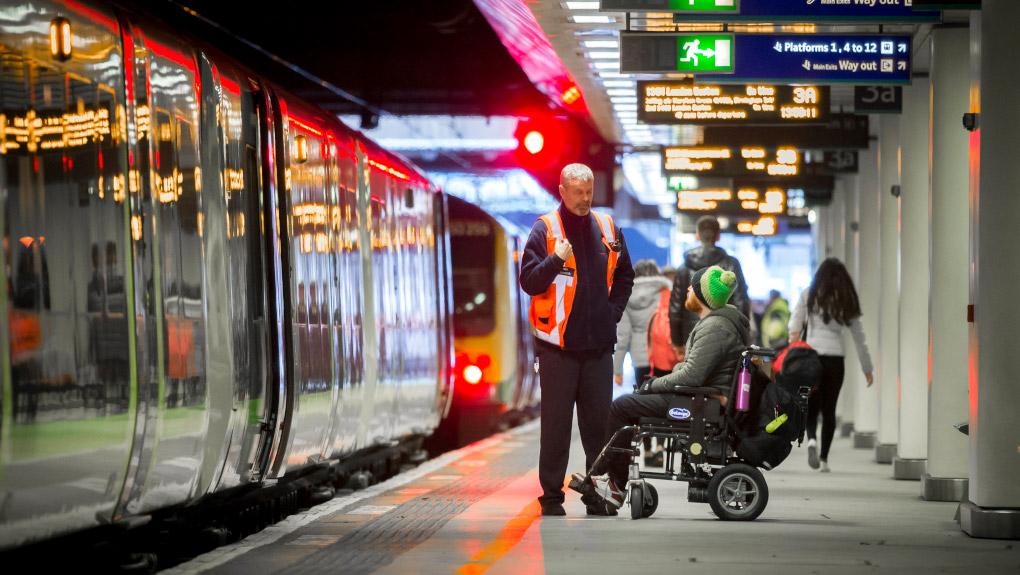
Hello and welcome to the April newsletter.
The last few months have been busy as we have progressed work protecting the interests of rail passengers and securing improvements across the consumer areas that we regulate.
Firstly, we reported on an audit we commissioned of how a sample of five train operating companies were meeting regulatory requirements related to the delivery of passenger assistance.
We know that when booked assistance is delivered successfully passenger satisfaction is high, but when assistance fails it can significantly impact the well-being of passengers and their overall travel experience.
Specific actions detailed in this report included the more widespread adoption of the Passenger Assist staff app to improve communication between departure and destination stations when delivering assistance. This will improve the reliability of the service and deliver a more inclusive travel experience for all.
Secondly we published our first report reviewing the reliability of over 1300 Network Rail-managed passenger lifts at 491 stations, including how real-time information is provided to passengers regarding lift faults. Lift reliability is important for an accessible railway and when a lift is unavailable, accurate information is then essential for confident journey planning
We found that lift reliability is either in decline or static and we are taking further action to understand Network Rail’s monitoring and management processes, to ensure it is taking appropriate measures to plan and carry out maintenance and repairs. This includes ensuring that better information is available when lifts are out of order for any reason.
Thirdly, we have worked with independent rail ticket retailers following our review in December 2023 into ‘drip pricing’, which showed that some retailers were not sufficiently transparent about the additional fees they charged on their websites and apps. We focused on improving transparency, fairness and clarity for consumers when buying tickets online.
Every retailer we reviewed engaged positively with us, recognising the importance of complete transparency regarding fees from the outset of the ticket purchasing process. As a result, most have made improvements already with further changes being worked on by some. We will continue to monitor progress in advance of new laws being introduced to ban such practices.
Finally, we were pleased to see the cap on administration fees for ticket refunds reduced from £10 to £5. This reduction follows our review, where we found notable differences between the cost of processing a refund - on average less than £5 - and the allowed maximum admin fee of £10. We called on industry to review the fees.
We remain committed to progressing the work detailed in each of these areas and to ensuring that all parts of the industry remain focused on these key areas of the passenger experience.
Later this month we will be publishing further work looking at understanding disabled passengers’ experience of train operators' complaints processes.
Stephanie Tobyn
Director of Strategy, Policy and Reform
Top stories
Open access service given green light between London and Stirling
Passengers should have a new way to travel between London and Stirling starting June 2025, following approval of Grand Union Trains’ application to ORR to run four daily services on this route. This is the first time an open access operator, independent of government funding, will be offering services on the West Coast Main Line.
The new route will also include stops in Milton Keynes, Nuneaton, Crewe (potentially), Preston, Carlisle, Lockerbie and Motherwell, and will mean several towns getting their first direct connection to London. This increased competition is expected to benefit passengers with more choices and potentially lower fares.
Control Period 7 begins
1 April marked the start of Control Period 7 (CP7) – Network Rail’s five-year plan totalling approximately £45bn in cash terms (approximately £43bn in today’s prices, adjusted for forecast inflation) for the operation, support, maintenance and renewals expenditure across Great Britain in the five-year control period.
The key elements of CP7 are:
- Train performance – we have set specific train performance requirements that protect the interests of passengers and freight.
- Freight growth – we have set challenging targets for what Network Rail delivers for freight operators.
- Renewing the railway – with a particular focus on core assets such as track, structures and earthworks.
- Managing risks effectively – we require Network Rail to maintain sufficient and well-managed levels of risk funding.
- Delivering value for money – we have carefully reviewed Network Rail’s efficiency targets for the next five years and, drawing on a range of evidence, found these to be stretching but achievable.
- Protecting the environment - to support the move towards a low emissions railway, we will hold Network Rail to account for delivering a more than 20% reduction in its carbon emissions.
Blogs
World Engineering Day 2024
In her blog celebrating World Engineering Day 2024, Rhona Marsland, Principal Highways Engineer based at ORR’s Glasgow office, discusses her engineering inspiration and her role holding National Highways to account.
In his blog celebrating World Engineering Day 2024, Andy Barron, a Senior Engineer for Sustainable Development, describes his career path and how it led him to ORR and the pride he feels working on decarbonising the railway.
Working with the rail industry to respond to cyber security threats
Paul Appleton, Deputy Director, Railway Safety, discusses cyber security risks, which pose a real and present risk for the rail industry with potential safety implications clear. In his blog, Paul sets out our work with industry to ensure it is properly equipped to assess, prevent and respond to cyber security threats and incidents.
Statistics
- Passenger rail performance - Oct - Dec 2023 (Q3)
- Signals passed at danger (SPADs) - Oct - Dec 2023 (Q3)
- Freight rail usage and performance - Oct - Dec 2023 (Q3)
- Passenger rail usage - Oct - Dec 2023 (Q3)
- Passenger rail performance: Cancellations data - 4 Feb 2024 - 2 Mar 2024 (Period 12)


